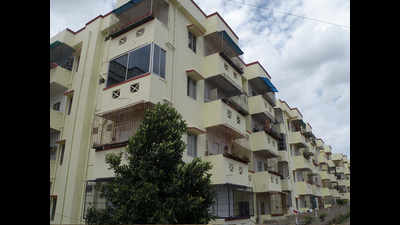- News
- City News
- chennai News
- Suburban budget housing the new investor haven
Trending
This story is from April 3, 2018
Suburban budget housing the new investor haven

Representative image
For long, the Chennai residential market had been driven by end users. The core city is still dominated (almost 85%) by them, but suburbs are no longer so, show investment trends in affordable housing projects.
A plethora of factors like increased rental income on investment, lesser interest burden on loans, lower upfront payment of margin money, lower outgo of pre-equated monthly instalment (EMI), better scope for capital appreciation, possibility for spreading risks and scope for part liquidation of assets are attracting investors to affordable housing projects on the outskirts.These buildings are located within a 30km-40km radius of the city, especially in blue-collar dominated regions where demand for rental accommodation is high.

A comparative study of a typical city project and an affordable housing project would put things in perspective. For instance, a 1,000sqft apartment in an upmarket area in the city costs ?16,000/sqft or ?1.6 crore for the apartment. In comparison, with the same money, an investor can buy eight budget apartments in the suburbs at ?20 lakh per unit. While the apartment in the city would fetch ?35,000 per month in rent, the eight budget apartments could fetch a cumulative ?56,000.
Even when there is hardly any capital appreciation in city projects owing to a market slowdown, budget housing still lends scope for increase in capital value. The scope of land value — of a ?600/sqft built-up area — doubling in about six years is still possible in budget housing.
Buyers are well-informed these days, said Knight Frank Chennai director Kanchana Krishnan. “Chennai’s image as an investor-unfriendly market is slowly changing. A number of millennials with deep pockets are looking to invest in budget housing. While earlier there weren’t too many options, today a buyer is spoilt for choice. The segment is maturing as there are many big players promoting budget housing in the city. As a nation too, we are working towards providing housing for all,” she said.
The trend in the city’s budget housing market is surprising, but interesting, noted Jones Lang LaSalle India CEO Ramesh Nair. “People are getting risk averse. Instead of putting all eggs in one basket, buyers want to spread the risk. As budget housing buildings are low-rise, they get completed faster than high-rise luxury buildings. That is another reason why buyers feel comfortable,” said Nair.
Terming the change an aberration, chairman of Anarock Property Consultants Anuj Puri said, “Budget housing in other parts of the country is still end-user driven. Almost 90%-95% of buyers in this segment in other cities are end users,” said Puri.
A plethora of factors like increased rental income on investment, lesser interest burden on loans, lower upfront payment of margin money, lower outgo of pre-equated monthly instalment (EMI), better scope for capital appreciation, possibility for spreading risks and scope for part liquidation of assets are attracting investors to affordable housing projects on the outskirts.These buildings are located within a 30km-40km radius of the city, especially in blue-collar dominated regions where demand for rental accommodation is high.

A comparative study of a typical city project and an affordable housing project would put things in perspective. For instance, a 1,000sqft apartment in an upmarket area in the city costs ?16,000/sqft or ?1.6 crore for the apartment. In comparison, with the same money, an investor can buy eight budget apartments in the suburbs at ?20 lakh per unit. While the apartment in the city would fetch ?35,000 per month in rent, the eight budget apartments could fetch a cumulative ?56,000.
More than 50% of buyers in the affordable housing segment are investors, say developers. For a city which has long been considered an investor-unfriendly market, it is quite an achievement. Sebi Christopher, a senior executive at a medical equipment manufacturing firm, has purchased two budget apartments in the suburbs and is looking to buy one more. “There are no frills in budget housing and hence no surprise bills that will leave a hole in the pocket,” he said. “Low maintenance is another attraction,” he said. Dr P Nanthakumar of
Tuticorin has bought a single-bedroom apartment near Chennai and is looking for more such investments. Ganapathy, a ex-employee of Delhi electricity board, invested his wife’s retirement benefits on two budget apartments. “I live near Trichy, but will soon move into one of the apartments and will rent out the other,” he said.
Even when there is hardly any capital appreciation in city projects owing to a market slowdown, budget housing still lends scope for increase in capital value. The scope of land value — of a ?600/sqft built-up area — doubling in about six years is still possible in budget housing.
Buyers are well-informed these days, said Knight Frank Chennai director Kanchana Krishnan. “Chennai’s image as an investor-unfriendly market is slowly changing. A number of millennials with deep pockets are looking to invest in budget housing. While earlier there weren’t too many options, today a buyer is spoilt for choice. The segment is maturing as there are many big players promoting budget housing in the city. As a nation too, we are working towards providing housing for all,” she said.
The trend in the city’s budget housing market is surprising, but interesting, noted Jones Lang LaSalle India CEO Ramesh Nair. “People are getting risk averse. Instead of putting all eggs in one basket, buyers want to spread the risk. As budget housing buildings are low-rise, they get completed faster than high-rise luxury buildings. That is another reason why buyers feel comfortable,” said Nair.
Terming the change an aberration, chairman of Anarock Property Consultants Anuj Puri said, “Budget housing in other parts of the country is still end-user driven. Almost 90%-95% of buyers in this segment in other cities are end users,” said Puri.
End of Article
FOLLOW US ON SOCIAL MEDIA










